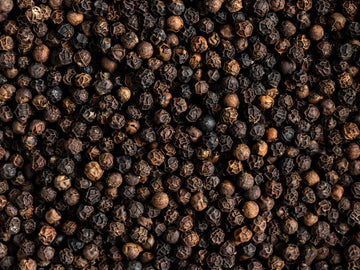In 2022, the average U.S. household spent nearly three times more on nonprescription vitamins than they did in 2007 [1]. The big question is, are we actually getting triple the health benefits, or just more expensive pee? There is no doubt that many supplements are clinically proven through numerous studies to have profound effects, however their effectiveness often depends on how well the body can absorb them. That is where BioPerine comes in.
Piperine, an alkaloid, is the primary ingredient found in black pepper which gives it its pungent and spicy taste. Alkaloids are naturally occurring organic compounds that contain nitrogen atoms, and often have significant biological effects on the human body. Examples of common alkaloids include morphine, caffeine, and nicotine. BioPerine is a patented extract from black pepper (Piper nigrum) that is 95% piperine. It has gained recent popularity for its ability to enhance the bioavailability (the amount of substance that is actually absorbed by the body) of various nutrients and supplements, but how does it work? Let's dive into the science behind BioPerine and why it is becoming a crucial component in many supplement formulations.
1. Inhibition of Enzymes that Break Down Nutrients
One of the primary ways BioPerine enhances absorption is by inhibiting specific enzymes found in the liver and intestines such as CYP3A4 and P-glycoprotein. These enzymes metabolize and breakdown nutrients and other compounds before they can be fully absorbed by the body. They help our body clear out and avoid things like drug toxicity, but on the other hand, they also reduce the therapeutic effectiveness of drugs. BioPerine reduces the effect of these enzymes and thus results in the slow down in the breakdown process, allowing more of the supplement's active ingredients to enter the bloodstream and remain available for longer. This is especially important for herbal nutrients and compounds that the body typically metabolizes quickly. In a piperine focused study, scientists found that dietary piperine affected the plasma concentrations of P-glycoprotein and CYP3A4 in humans [2].
2. Thermogenic Action
BioPerine is known to stimulate thermogenesis, which is the process of heat production in living organisms. BioPerine works on the epithelial cells of the small intestine by releasing catecholamines which are thermogenic hormones. When thermogenesis occurs, the demand for fresh nutrients to sustain the metabolic processes rapidly increase [3].
3. Increased Intestinal Permeability
Another key mechanism in BioPerine's ability to increase absorption is through an increase in the permeability of the intestinal lining. The cells in the intestine are tightly packed together to control what gets absorbed into the bloodstream. BioPerine temporarily loosens the tight connections between these cells, making it easier for nutrients and active compounds to pass through and be absorbed by the bloodstream [4][5]. Improved absorption can significantly improve the effectiveness of supplements and medication.
How to take BioPerine?
When should you take BioPerine?
BioPerine can be taken day or night. BioPerine's effects are relatively short-lived so if it is taken for enhancing supplement absorption then it should be taken at the same time as the supplement.
Should you take BioPerine with food?
BioPerine can be taken with or without food. Some users may find it leads to mild stomach discomfort so they take it after a meal or small snack.
What dose of BioPerine should you take?
The optimal dose of BioPerine for enhancing absorption of other nutrients and supplements is 5-10mg.
References
-
https://www.statista.com/statistics/630728/us-household-expenditure-on-nonprescription-vitamins/
-
Bhardwaj RK, Glaeser H, Becquemont L, Klotz U, Gupta SK, Fromm MF. Piperine, a major constituent of black pepper, inhibits human P-glycoprotein and CYP3A4. J Pharmacol Exp Ther. 2002 Aug;302(2):645-50. doi: 10.1124/jpet.102.034728. PMID: 12130727.
-
Fernández-Lázaro D, Mielgo-Ayuso J, Córdova Martínez A, Seco-Calvo J. Iron and Physical Activity: Bioavailability Enhancers, Properties of Black Pepper (Bioperine®) and Potential Applications. Nutrients. 2020 Jun 24;12(6):1886. doi: 10.3390/nu12061886. PMID: 32599787; PMCID: PMC7353321.
-
Khajuria A, Thusu N, Zutshi U. Piperine modulates permeability characteristics of intestine by inducing alterations in membrane dynamics: influence on brush border membrane fluidity, ultrastructure and enzyme kinetics. Phytomedicine. 2002 Apr;9(3):224-31. doi: 10.1078/0944-7113-00114. PMID: 12046863.
-
Feng X, Liu Y, Wang X, Di X. Effects of piperine on the intestinal permeability and pharmacokinetics of linarin in rats. Molecules. 2014 Apr 30;19(5):5624-33. doi: 10.3390/molecules19055624. PMID: 24786847; PMCID: PMC6271293.




